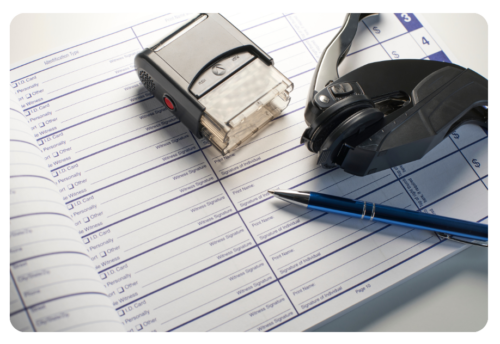




Our award-winning platform ensures documents are properly executed, legally binding, and compliant with necessary regulations.
When you’re backed by Stewart Title – a global powerhouse synonymous with trust, stability, security, and expertise – you bring that legacy to every transaction.
That’s why the world’s largest brands rely on NotaryCam to handle their important transactions with enterprise-grade security, seamless accessibility, and unwavering reliability.
You get the flexibility to offer e-signatures, RON (Remote Online Notarization), and IPEN (In-Person Electronic Notarization). Only we provide all these options, serving clients around the globe.
Whether you’re looking for a comprehensive solution or a simple notarization service, we make it easy, secure, and accessible for your business and your clients.

Learn how we support your industry.
Top Rated Notary Service
Our platform and notaries deliver exceptional service every day. Thousands of reviews and an average rating of 4.8/5 stars demonstrates our commitment to satisfaction.
| FEEDBACK
“NotaryCam values the importance of people in this process. That makes all the difference to our medical credentialing process.”
Awarded Eight Consecutive Years








| CASE STUDIES
From credit unions to loss mitigation transactions, here we share a few client success stories.
| ANSWERS TO YOUR QUESTIONS
What’s the Difference Between Notarization and Signing?
Key Difference: Signing services facilitate the process of putting a signature on a document, while notarization is the act of signing before a notary public and attesting that the signer is who they say they are. Both ensure the document is enforceable against the party who signed.
Signing Services manage the logistics of document signing, including scheduling, coordinating with notaries, and ensuring proper execution. They streamline the process using technology like e-signatures and remote notarization.
Notarization is the legal verification of a signature’s authenticity, ensuring the signer’s identity and willingness. It deters fraud and creates a public record for legal use.

Now Hiring Notaries!
| MORE FREQUENTLY ASKED QUESTIONS
A notary is a public official who plays a critical role in ensuring the authenticity and integrity of important documents. Their responsibilities include verifying the identities of signers and clarifying that the signatures are made voluntarily. Notaries often witness signings for documents like contracts, deeds, affidavits, powers of attorney, and other legal paperwork.
In recent years, the rise of online notarization has made the process even more accessible. An online notary (also known as a remote notary) can perform the same duties as a traditional notary but does so electronically via secure video conferencing platforms. This can allow people to complete notarizations from anywhere, at any time, without needing to be in the same location as the notary. Online notary services are often available 24/7, making them a convenient and flexible option for individuals and businesses. With secure technology, online notarization can provide a fast, reliable way to notarize documents, especially for those with busy schedules or in different time zones.
*State laws regarding notary services can vary, so it's important to be aware of the specific requirements in your area. To ensure compliance, it's recommended to check with an attorney or consult state legislation.
Online notarization laws vary by state, but where Remote Online Notarization (RON) is permitted, the following types of documents are typically eligible for notarization:
Powers of Attorney (POA) – Both general and healthcare POAs can often be notarized online.
Wills and Living Wills – While some states require in-person notarization for wills, living wills can generally be notarized online.
Affidavits – Commonly notarized documents such as affidavits of support, identity, and truth.
Contracts – Business agreements, leases, and employment contracts are often notarized remotely.
Real Estate Documents – Deeds, mortgage agreements, and title transfers can be notarized online in many states.
Loan Documents – Mortgage and refinancing papers often qualify for online notarization.
Business Documents – Articles of incorporation, bylaws, and operating agreements.
Estate Planning – Trusts and guardianship agreements can typically be notarized remotely.
However, some states impose specific rules and restrictions, such as requiring in-person notarization for certain documents like wills or requiring additional steps for some types of notarizations. Always verify your state's regulations before proceeding.
Yes, reputable online notary services, like NotaryCam, use secure platforms with encryption to protect your personal and document information. We always recommend verifying the service's security measures before proceeding.
For online notarization, you'll typically need a government-issued photo ID, such as a driver’s license or passport. The notary will often verify your identity using the ID and may also use additional methods like knowledge-based authentication (KBA), depending on state requirements. Some states may require that the ID be valid and unexpired, so it's important to check local guidelines. Always have your ID ready before starting the notarization session.






 Your Privacy Choices
Your Privacy Choices


